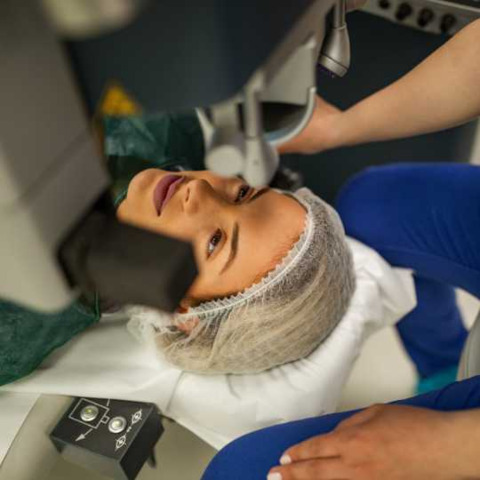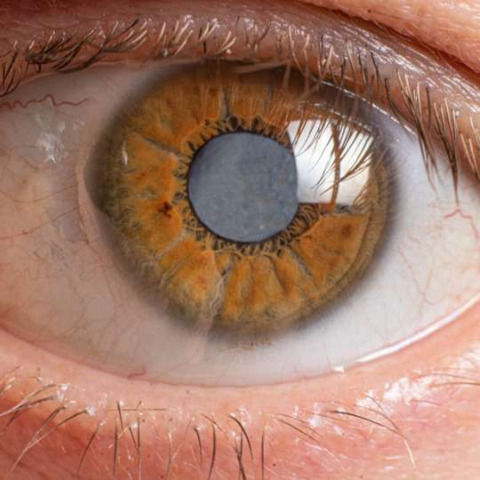

Laser eye surgery is a medical procedure that uses a precise laser to reshape the cornea, the clear front part of the eye, in order to correct common vision problems such as nearsightedness, farsightedness, and astigmatism. The goal of laser eye surgery is to reduce or eliminate the need for glasses or contact lenses, thereby improving a person's quality of life.
People choose laser eye surgery because it offers a variety of benefits, including:
- Improved vision: Most patients experience a significant improvement in their vision, with many achieving 20/20 vision or better after the procedure.
- Long-lasting results: The vision correction achieved through laser eye surgery is generally stable and long-lasting, with only a small percentage of patients requiring further treatment or enhancements.
- Quick recovery: Recovery time is typically short, with most patients returning to their daily activities within a few days after the surgery.
- Minimally invasive: Laser eye surgery is a minimally invasive procedure with no need for stitches or bandages, resulting in a lower risk of complications and infections compared to other surgical procedures.
- Convenience: By reducing or eliminating the need for glasses or contact lenses, laser eye surgery can make everyday tasks and activities more convenient and enjoyable.
In Turkey, various types of laser eye surgery are available to correct vision problems. The most common types include:
- LASIK (Laser-Assisted in Situ Keratomileusis): This is the most popular laser eye surgery technique. It involves creating a thin flap on the cornea, lifting it, and then reshaping the underlying corneal tissue using an excimer laser. Afterward, the flap is repositioned to facilitate healing.
- PRK (Photorefractive Keratectomy): PRK is a predecessor to LASIK and is still used for specific cases. It involves removing the outer layer of the cornea (epithelium) and reshaping the corneal tissue underneath using an excimer laser. The epithelium regenerates naturally over time.
- LASEK (Laser-Assisted Subepithelial Keratomileusis): LASEK is a hybrid of LASIK and PRK. In this procedure, the epithelium is loosened using an alcohol solution and then lifted as a flap. The excimer laser is then used to reshape the cornea, after which the epithelial flap is repositioned.
- SMILE (Small Incision Lenticule Extraction): SMILE is a newer, minimally invasive procedure that uses a femtosecond laser to create a small incision and remove a thin layer of corneal tissue (lenticule) to reshape the cornea. This technique does not require creating a corneal flap, reducing the risk of certain complications.
- Epi-LASIK: This technique is similar to LASEK but uses a special microkeratome (epikeratome) to separate the epithelium from the underlying corneal tissue. The excimer laser is then used to reshape the cornea, and the epithelial layer is repositioned.
The best type of laser eye surgery for a patient depends on various factors, such as the thickness of the cornea, the degree of refractive error, and individual lifestyle factors. An experienced eye surgeon will recommend the most appropriate procedure based on a thorough evaluation.
LASIK (Laser-Assisted in Situ Keratomileusis) differs from PRK (Photorefractive Keratectomy) and other laser eye surgery methods in terms of the procedure, recovery time, and potential risks. Here's a comparison of LASIK with PRK and other methods:
1. Procedure:
- LASIK: A thin flap is created on the cornea using a microkeratome or femtosecond laser. The flap is lifted, and the excimer laser reshapes the underlying corneal tissue. Finally, the flap is repositioned, allowing it to heal naturally.
- PRK: The outer layer of the cornea (epithelium) is removed, and the excimer laser reshapes the exposed corneal tissue. The epithelium regenerates naturally over time, usually within a week.
- LASEK and Epi-LASIK: These methods involve loosening and lifting the epithelium as a flap before using the excimer laser to reshape the cornea. The epithelial flap is then repositioned.
- SMILE: A femtosecond laser creates a small incision and removes a thin layer of corneal tissue (lenticule) to reshape the cornea. This technique does not require creating a corneal flap.
2. Recovery time:
- LASIK typically has a faster recovery time compared to PRK, LASEK, and Epi-LASIK, with most patients experiencing significant vision improvement within a day or two. In contrast, PRK, LASEK, and Epi-LASIK may require a longer recovery time as the epithelium needs to regenerate.
- SMILE also offers a relatively fast recovery time, similar to LASIK, as it does not involve creating a corneal flap.
3. Potential risks:
- LASIK carries the risk of flap-related complications, such as flap dislocation or incomplete flaps. However, these risks are generally low and have decreased with the use of femtosecond lasers.
- PRK, LASEK, and Epi-LASIK do not involve flap creation, reducing the risk of flap-related complications. However, they may cause more discomfort and have a longer recovery time.
- SMILE has lower risks of flap-related complications and dry eye issues, as it is a minimally invasive procedure.
Laser eye surgery offers several benefits but also comes with potential risks and drawbacks. Here are the pros and cons of laser eye surgery:
Pros:
- Improved vision: Laser eye surgery can significantly improve vision and reduce or eliminate the need for glasses or contact lenses for many people.
- Fast results and recovery: Most laser eye surgery techniques, such as LASIK and SMILE, offer quick visual recovery, with noticeable improvement within a day or two.
- High success rate: Laser eye surgery has a high success rate, with the majority of patients achieving the desired outcome.
- Long-lasting results: The results of laser eye surgery are generally long-lasting, with many patients enjoying stable vision for years.
- Minimally invasive: Laser eye surgery is minimally invasive, with most techniques not requiring sutures or a long healing process.
Cons:
- Not suitable for everyone: Some individuals, such as those with thin corneas or certain eye conditions, may not be suitable candidates for laser eye surgery.
- Potential complications: Although rare, complications can occur, including infection, dry eyes, glare, halos, or under/overcorrection of vision.
- Cost: Laser eye surgery can be expensive, and it may not be covered by some insurance plans.
- Permanent changes: The corneal reshaping performed during laser eye surgery is irreversible, which may be a concern for some patients.
- Age-related vision changes: Laser eye surgery cannot prevent age-related vision changes, such as presbyopia or cataracts, which may require additional treatments or corrective lenses in the future.
To determine if you are a good candidate for laser eye surgery in Turkey, several factors need to be considered. Generally, a suitable candidate for laser eye surgery should:
- Be at least 18 years old, as vision tends to stabilize around this age.
- Have a stable prescription for at least 1-2 years, as significant changes in prescription may affect the outcome of the surgery.
- Have a healthy cornea with sufficient thickness, as laser eye surgery requires reshaping the cornea.
- Have no history of eye diseases, such as glaucoma, cataracts, or certain corneal disorders.
- Have realistic expectations about the outcome of the surgery and understand that it may not completely eliminate the need for glasses or contact lenses, especially for reading or close-up tasks as one ages.
Laser eye surgery is a relatively quick and minimally invasive procedure. The exact steps and duration of the surgery depend on the type of laser eye surgery being performed (such as LASIK, PRK, or LASEK), but generally, the process involves the following steps:
1. Numbing eye drops are applied to ensure the patient's comfort during the procedure.
2. The surgeon uses a specialized instrument to keep the eye open and prevent blinking.
3. A protective corneal flap is created in LASIK or a thin layer of the corneal epithelium is removed in PRK and LASEK.
4. The surgeon uses an excimer laser to reshape the cornea, correcting the refractive error. The laser precisely removes microscopic layers of corneal tissue according to the patient's prescription.
5. The protective corneal flap is repositioned in LASIK, or a bandage contact lens is applied in PRK and LASEK to promote healing and protect the treated area.
6. The surgery is completed, and the patient is given a short time to rest before being discharged.
The actual laser treatment usually takes only a few minutes per eye, and the entire procedure, from preparation to completion, typically takes around 15-30 minutes. Since laser eye surgery is an outpatient procedure, patients can go home shortly after the surgery. However, they should arrange for someone else to drive them home, as their vision may be blurry or hazy for a few hours after the procedure.
After laser eye surgery, patients can expect a recovery process that varies depending on the type of surgery performed (LASIK, PRK, or LASEK). Here's what you can generally expect during the recovery process:
- Immediately after the procedure, you may experience mild discomfort, itching, or a burning sensation in the treated eye(s). These sensations are normal and typically subside within a few hours. You may also have blurry or hazy vision immediately after the surgery, but this should improve gradually.
- You will be given protective eye shields or goggles to wear for the first few hours or overnight to prevent rubbing or accidentally bumping your eyes.
- You'll be prescribed eye drops to help prevent infection, reduce inflammation, and keep your eyes lubricated during the healing process.
- For LASIK patients, vision improvement is typically rapid, with most patients noticing significant improvement within 24-48 hours. Complete vision stabilization may take a few weeks.
- PRK and LASEK patients may experience a slower recovery process, with vision improvement taking a few days to a week and stabilization taking several weeks to a few months.
- You will have follow-up appointments with your eye surgeon to monitor your progress and ensure proper healing. The first appointment is usually scheduled within the first 24-48 hours after surgery.
- During the recovery period, it is essential to avoid strenuous activities, swimming, using hot tubs, and wearing eye makeup to minimize the risk of infection and ensure proper healing.
- Most patients can return to work and resume normal activities within a few days following LASIK surgery and a week or two for PRK and LASEK patients.
The results of laser eye surgery can be long-lasting, but the exact duration can vary depending on individual factors such as the patient's age, eye health, and the type of surgery performed.
For many patients, LASIK and other laser eye surgeries can provide stable vision correction for many years or even decades. However, it's important to note that laser eye surgery does not prevent age-related vision changes, such as presbyopia (age-related farsightedness) or cataracts. These conditions may still develop as you age, and you may require reading glasses, additional corrective lenses, or other treatments in the future.
In some cases, patients may experience a slight regression in their vision correction over time, which could necessitate an enhancement procedure or the use of corrective lenses to maintain optimal vision. It's important to have regular eye examinations to monitor your eye health and vision changes over time.
Laser eye surgery costs in Turkey are generally more affordable than those in Western Europe and the USA. While the exact price of laser eye surgery can vary depending on factors such as the specific procedure, clinic, and surgeon's experience, patients can typically expect to save a significant amount by choosing to have their surgery in Turkey.
In Turkey, laser eye surgery costs can range from $1,000 to $2,500 per eye, depending on the procedure and clinic chosen. In contrast, the cost of laser eye surgery in Western Europe can range from $2,500 to $4,000 per eye, and in the USA, it can range from $3,000 to $5,500 per eye or even higher.
It's important to remember that the total cost of the surgery should include preoperative consultations, the surgery itself, postoperative care, and any additional expenses such as accommodation and travel. When comparing prices, make sure to consider the overall package offered and the reputation of the clinic and surgeon to ensure you receive high-quality care.
Even with the additional costs of travel and accommodation, many patients find that undergoing laser eye surgery in Turkey offers significant savings and excellent quality of care.
Choosing Elara Medical Tourism for your laser eye surgery in Turkey offers several advantages that make us an ideal choice for your healthcare needs. Some of the reasons to select Elara Medical Tourism include:
1. Expertise and experience: We work with a network of highly skilled and experienced ophthalmologists who specialize in laser eye surgery. Our partner clinics and surgeons are renowned for their expertise and use state-of-the-art technology to provide excellent patient outcomes.
2. Personalized care: At Elara Medical Tourism, we prioritize your individual needs and preferences. Our team is dedicated to providing personalized care and support throughout the entire process, from initial consultation to postoperative care and follow-up.
3. Comprehensive packages: We offer comprehensive, all-inclusive packages that take care of every aspect of your medical journey, including preoperative consultations, the surgery itself, postoperative care, and any necessary travel and accommodation arrangements.
4. Cost-effective: By choosing Elara Medical Tourism, you can benefit from the competitive prices for laser eye surgery in Turkey. Our affordable pricing, combined with the high-quality care we provide, makes us an excellent choice for patients seeking top-notch medical care at a reasonable cost.
5. Transparent communication: We understand the importance of clear and open communication throughout your medical journey. Our team is always available to answer your questions, address your concerns, and provide you with the information you need to make informed decisions about your care.
6. Convenience and comfort: We make it easy for you to access world-class medical care in Turkey by handling all the logistics, including travel arrangements, accommodation bookings, and transportation. We ensure that your experience is as seamless and stress-free as possible, allowing you to focus on your health and recovery.
By choosing Elara Medical Tourism for your laser eye surgery in Turkey, you can be confident that you are in good hands and will receive the best possible care and support throughout your medical journey.


